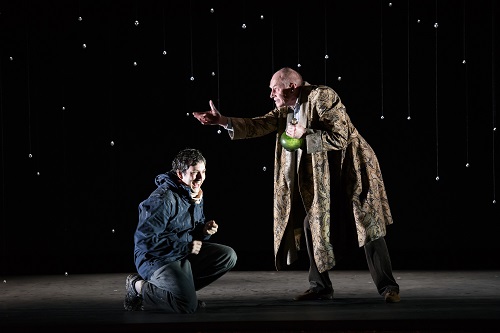 United Kingdom Stuart McRae, The Devil Inside: Soloists, the Music Theatre Wales Ensemble, Michael Rafferty (conductor). Peacock Theatre, London, 3.2.2016 (MB)
United Kingdom Stuart McRae, The Devil Inside: Soloists, the Music Theatre Wales Ensemble, Michael Rafferty (conductor). Peacock Theatre, London, 3.2.2016 (MB)

Stuart McRae, The Devil Inside
Cast:
Richard – Nicholas Sharratt
James – Ben McAteer
Old Man, Vagrant – Steven Page
Catherine – Rachel Kelly
Production:
Matthew Richardson (director)
Samal Blak (designs)
Ace McCarron (lighting)
An excellent new opera, jointly commissioned and co-produced by Music Theatre Wales and Scottish Opera, The Devil Inside received its premiere at the Theatre Royal, Glasgow (23 January) and, following a visit to Edinburgh, continued its touring life in London. Not the least of the evening’s discoveries for me was the Peacock Theatre on Portugal Street: used by the LSE during the day, and turning properly theatrical at night. It is a splendid space, of which I hope to see more.
Stuart McRae and his librettist, Louise Welsh, have produced a finely crafted opera in seven scenes, none overstaying its welcome, the whole more than the sum of its parts. ‘Inspired’ by Robert Louis Stevenson’s The Bottle Imp, we enter the sub-Faustian world of late capitalism and ‘property development’. That, however, is the setting rather than the substance; the bargain is the thing. James and Richard, lost in the mountains, meet an old man who offers them a way to become as rich as he is, if they buy a green bottle from him. Tempered in the flames of Hell, it contains an imp who will grant the owner his every wish; the catch is that, if you remain in possession of it when you die, you will go to Hell, and the only way of ridding yourself of it is to sell it on for less than you paid for it. And so, the story continues, James as rich as, well, a property developer, before selling it on to Richard, who remains haunted, consumed by it. Having met Catherine, who becomes his wife, James must regain the bottle when he learns of her terminal illness. The price has sunk so low that they must go abroad, where the currency is worth less. Eventually, and just in time, Richard, addicted to the bottle and its imp, takes it for one centime from Catherine, makes his last wish and dies. What, however, has Catherine wished for just before? If the Devil has made her pregnant, then…?
The libretto works as it should, as a libretto, rather than as a stand-alone piece. McRae clearly relished the opportunities it offered, for again, his music works as it should, as musical drama, not as stand-alone music. It is atmospheric, characterful, resourceful, and more. The smallish ensemble is full of intriguing solos and instrumental blends. Two harmonicas make for a frightening duet; interestingly (I only noticed this afterwards from the programme), they are played by the two violinists. Deep sounds – we are dealing, after all, with an opera forged in Hell – are often to the fore: alto flute, bass clarinet, contrabassoon, trombone. But so are fantastical, post-Britten glistenings, silver and gold, as befits the prize and the delusions it offers. The music for the bottle and its imp itself does not in any sense sound ‘like’ Wagner’s for the Tarnhelm, but the unnerving mixture of timbre and harmony produces what is perhaps not an entirely dissimilar effect. (Or maybe that was just my fancy!) It is perhaps inevitable that the sound of chamber opera in English brings to mind composers such as Britten and Birtwistle; I am not sure that I detected specific influence, although I am not sure that I did not, either. More importantly, the score sounds apposite, guides the action, indeed in many cases is the action (the interludes in particular, although not only then), and makes for a chilling night in the theatre.
Michael Rafferty’s direction of the Music Theatre Wales Ensemble seemed wise and assured throughout, balancing musical and theatrical impulses to excellent effect, as did the playing of the instrumentalists themselves. All four members of the cast created their characters to equally fine effect; they sprang off the page into our mythical consciousness. Nicholas Sharratt’s Richard proved properly ambivalent, ultimately human and loving, yet not without weakness. Rachel Kelly’s Catherine seemed too good to be true, and in a sense was: was not her obsession with having a child as dangerous as the others’ obsession with the bottle and its imp? Ben McAteer made James’s sorry descent utterly credible from beginning to end. Steven Page’s Old Man and Vagrant (on the far-away island, briefly in possession of the bottle himself) made their theatrical point vividly and without histrionics. The resourceful production from Matthew Richardson and his team left nothing to be desired. So much can be done with intelligent direction, designs, and props, that attention was focused where it should be: upon what emerged as a new and important re-telling of an old, powerful tale.
Mark Berry
For details of the production’s tour, visit the website of Music Theatre Wales.
For a review of the Edinburgh performance see Scottish Opera’s Striking Re-imagining of Stevenson’s Bottle Imp.